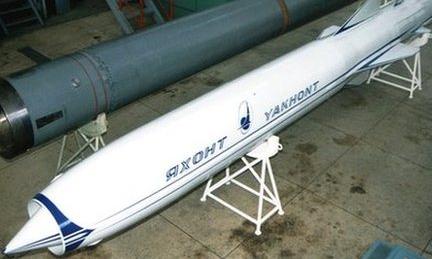
From Michael R. Gorden and Eric Schmitt, New York Times: Russia has sent advanced antiship cruise missiles to Syria, a move that illustrates the depth of its support for the Syrian government led by President Bashar al-Assad , American officials said Thursday.
Russia has previously provided a version of the missiles, called Yakhonts, to Syria. But those delivered recently are outfitted with an advanced radar that makes them more effective, according to American officials who are familiar with classified intelligence reports and would only discuss the shipment on the basis of anonymity.
Unlike Scud and other longer-range surface-to-surface missiles that the Assad government has used against opposition forces, the Yakhont antiship missile system provides the Syrian military a formidable weapon to counter any effort by international forces to reinforce Syrian opposition fighters by imposing a naval embargo, establishing a no-fly zone or carrying out limited airstrikes.
“It enables the regime to deter foreign forces looking to supply the opposition from the sea, or from undertaking a more active role if a no-fly zone or shipping embargo were to be declared at some point,” said Nick Brown, editor in chief of IHS Jane’s International Defense Review. “It’s a real ship killer.”
Jeffrey White, a fellow at the Washington Institute for Near East Policy and a former senior American intelligence official, said Syria’s strengthened arsenal would “tend to push Western or allied naval activity further off the coast” and was also “a signal of the Russian commitment to the Syrian government. . . .”
Secretary of State John Kerry has repeatedly said that it is the United States’ hope to change Mr. Assad’s “calculations” about his ability to hold on to power so that he will allow negotiations for a political solution to the conflict. Mr. Kerry indicated that he had raised the issue of Russian arms deliveries to Syria during his recent visit to Moscow, but declined to provide details.
“I think we’ve made it crystal clear we would prefer that Russia was not supplying assistance,” he said. “That hasn’t changed. . . .”
Syria ordered the coastal defense version of the Yakhont system from Russia in 2007 and received the first batteries in early 2011, according to Jane’s. The initial order covered 72 missiles, 36 launcher vehicles, and support equipment, and the systems have been displayed in the country.
The batteries are mobile, which makes them more difficult to attack. Each consists of missiles, a three-missile launcher and a command-and-control vehicle.
The missiles are about 22 feet long, carry either a high-explosive or armor-piercing warhead, and have a range of about 180 miles, according to Jane’s. . . .
Russia, for example, previously shipped SA-17 surface-to-air missiles to Syria. Israel carried out an airstrike against trucks that were transporting the weapons near Damascus in January. Israel has not officially acknowledged the raid but has said it is prepared to intervene militarily to prevent any “game changing” weapons from being shipped to Hezbollah, the Lebanese militant group.
More recently, Israeli and American officials have urged Russia not to proceed with the sale of advanced S-300 air defense weapons. The Kremlin has yielded to American entreaties not to provide S-300s to Iran. But the denial of that sale, analysts say, has increased the pressure within Russia’s military establishment to proceed with the delivery to Syria. (photo: BBC)
Image: bbc%205%2017%2013%20Yakhont.jpg
